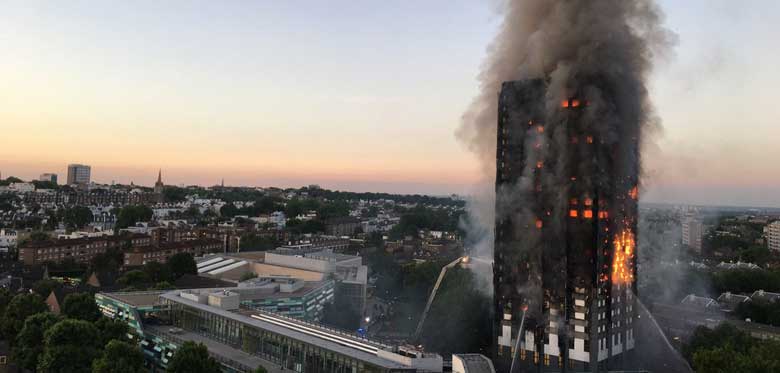The Prime Minister, Theresa May, has announced a ‘full public inquiry’ into the fire which engulfed the Grenfell Tower block, killing at least seventeen people.
The decision comes among increasing calls for answers as to why the fire at the residential block – which recently underwent a multi-million pound refurbishment – was able to spread so rapidly and to all floors of the building.
‘Impossible to identify all who died’
Thirty people remain in hospital and 74 have been treated for injuries in hospitals across London. It is unknown how many people remain unaccounted for, but police have warned that it may be impossible to identify all of those who died.
Mrs May visited the scene of the disaster on Thursday morning, shortly before announcing the inquiry, saying: “We need to know what happened, we need to know an explanation.
"We owe that to the families, to the people who have lost loved ones and the homes in which they lived."
It is not yet known what form the inquiry will take, or what powers those leading the investigation will have.
‘Statutory public inquiry’
Mike Pemberton, Head of Public Law at Stephensons said: ‘The first question to ask is if this public inquiry will be a ‘statutory public inquiry’ – under the Inquiries Act 2005 – or an ‘ad-hoc inquiry’ which is more flexible in its procedures and provides for a less formal and less adversarial approach.
‘A statutory inquiry is much more rigid as it must follow the procedures set out within that act. Evidence is usually taken under oath and witnesses can be compelled to attend by summons. This means that anyone who fails to attend upon request could be ‘held in contempt’ and anyone found to have knowingly supplied inaccurate or misleading information under oath could be guilty perjury.
‘The most recent example of a statutory inquiry is the Leveson inquiry into phone hacking.
‘Examples of ad-hoc non-statutory inquiries have included Deepcut (2004-2006), Chilcott (2009-2016) and the Harris Review (2014-2015). Whilst more flexible, the evidence is not taken under oath and the inquiry would have to rely upon the voluntary compliance of witnesses to attend.
‘In my professional opinion, given the seriousness and the scale of events we have seen over the past 48 hours, I would expect the announcement of a statutory inquiry.’
In the wake of the disaster, the local MP, David Lammy, demanded arrests over what he described as "corporate manslaughter".
‘Criminal charges’
Mr Lammy, who is the Labour MP for Tottenham said that the blaze was “a crime of the most horrendous kind.”
Rachel Adamson, told the Mail Online that for an incident of this size, it would be very likely criminal charges would be considered by the relevant authorities.
'Corporate manslaughter charges are often quite difficult to prove as they relate to the controlling mind of the business.
'If an individual is thought to have been negligent, a charge of manslaughter by gross negligence may be considered.
'There are a range of other potential charges, such as breach of fire regulations or breach of health and safety regulations, these are the tiers down from manslaughter.'


